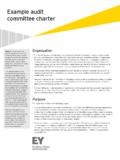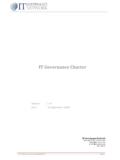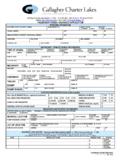Transcription of BUSA Charter of Ethical Business Practice - nacf.org.za
1 Page 1 of 2 South African Charter of Ethical Business Practice As businesses, we earn our licence to operate in society by being good corporate citizens, responsibly discharging our obligations and claiming our rights. In order to promote Ethical Business practices, BUSA commits to the following aspirational standards: Responsibility Responsibility requires taking ownership of, and being accountable for, our acts and omissions. It means that we take care of what is entrusted to us, recognising the economic, social and natural environments in which we operate. Because we value Responsibility, we commit to: Exercising our obligations with due care, diligence and the required skill.
2 Practising good governance in our Business strategies and operations. Upholding all applicable laws, rules, and standards. Pursuing Business practices that are economically, socially, and environmentally sustainable. Being prudent in our use of natural resources. Supporting growth and development in South Africa, by, amongst others, paying our due taxes. Integrity Integrity requires doing what we say, and always acting in good faith. This builds trust, which is necessary for Business to thrive. Because we value Integrity, we commit to: Being truthful and honest in all our dealings, disclosures and reporting. Honouring our commitments and delivering on our promises.
3 Refraining from activities that are corrupt or can be seen as promoting corruption in society. Being transparent when funding political activities. Respect Respect requires acknowledging others rights and inherent human dignity. Because we value Respect, we commit to: Treating customers, staff and all other stakeholders with dignity. Upholding basic human rights, including those set out in the South African Constitution. Duly considering the interests of people, communities and the environment where decisions could affect them. Refraining from arbitrary or unjustified discrimination against anyone. Ensuring a safe and healthy work environment. Recognising the interests and capabilities of those to whom we market our products or services.
4 Fairness Fairness requires even-handedly balancing the interests of various parties, ensuring that everyone gets what is rightfully due to them. Because we value Fairness, we commit to: Supporting free and fair competition by not being involved in price-fixing or other anti-competitive activities. Upholding just labour practices. Providing reasonable remuneration to employees. Negotiating in good faith, and refraining from coercion. Supporting freedom of association and collective bargaining. Being sensitive to social inequality in our Business practices. Page 2 of 2 Background to the Charter What is it? An aspirational Business Code of Ethics which could be applicable to the South African Business community.
5 It sets out what Ethical Business conduct means in the South African context. Why have it? The initiative for a Business Code of Ethics addresses the need for a formalised position of moral leadership from organised Business . The Charter is being proposed by BUSA s Anti-Corruption Working Group in response to the following resolutions taken at the third National Anti-Corruption Summit: To reaffirm that sectors and professional bodies must adopt sector and profession-specific codes of conduct and/or ethics as well as a training and communications regime to support their application. To implement effective anti-corruption communication and awareness programmes at community level, within the Business sector and across civil society.
6 Although it has originated in an anti-corruption context, it addresses Ethical Business conduct in general. How will it work? The aim is to have the Charter supported by as large a portion of the Business community as possible. BUSA leadership will approach its members to obtain buy-in. Members will be requested to promote the Charter among their members, until it cascades down to individual businesses. Since few of the Business bodies have the mandate or resources to regulate their members it is proposed that the document be an aspirational standard, as opposed to an enforceable set of rules. It is envisaged that organisations and businesses will support the Charter , rather than adopt it.
7 There might be a simple process whereby companies commit their support. Supporting companies could be listed on a website. How will it be managed? While no disciplinary process is envisaged, the Charter does provide a standard which can be cited where organised Business needs to publicly indicate its moral stance on unethical practices that might occur in South African Business from time to time. The Anti-Corruption Working Group proposes the following principles where large-scale unethical Business practices (such as incidents of price-fixing) make headlines: Organised Business (BUSA and / or the relevant member body) should release a public statement expressing its moral disapproval of the act.
8 Organised Business should engage with the offending companies at the highest level ( board level where applicable) to discuss steps which the companies will take to prevent recurrence of the unethical events. How was it drafted? A number of international Ethical Business standards and reference documents were consulted, such as the Caux Round Table Principles for Responsible Business , UN Global Compact, and the Harvard Global Business Standards Codex. The aim was to consolidate Business s main moral responsibilities in a values-based format. While the Charter is ultimately intended to guide the practices of businesses, it is written in such a way that it can be supported by BUSA, its member organisations, and businesses of any size.
9 In naming it a Charter instead of a Code it is hoped that any confusion between this document and organisations own Codes will be averted. August 2009








